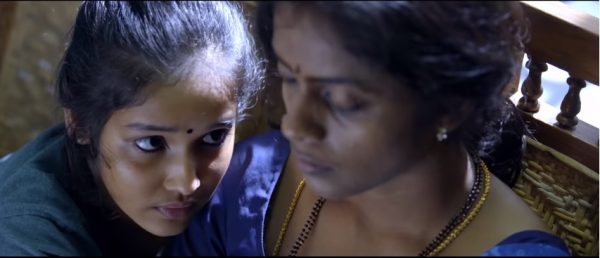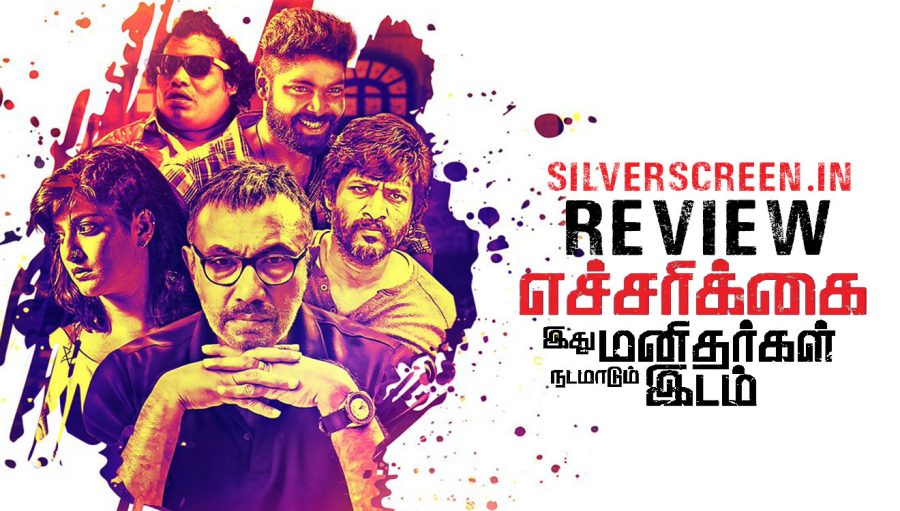Director: Sarjun KM
Cast: Sathyaraj, Kishore, Varalaxmi Sarathkumar, Yogi Babu
Composer: Sundaramurthy KS
Echcharikkai Idhu Manidhargal Nadamadum is not quite identifiable as a Sarjun KM product at first; for one, it doesn’t seem to have that distinct rooted setting that characterised both his short films – Maa and Lakshmi. Social commentaries by themselves, these films – unfolding in middle-class households, the birthplace of all that’s awesome and interesting – sparked passionate dialogue about morality and culture; if Lakshmi attracted controversy for portraying an extra-marital romance, Maa was lauded for its sensitive treatment of a teenage pregnancy. The films weren’t entirely perfect of course; they worked on generalisations, reinforced gender roles, and centered themselves around women who had husbands ranging from abusive to non-committal. The women shouldered the work, swam against the tide as the men languished in their comfortably conservative spaces, rarely given an opportunity to develop their arcs.
Echcharikkai, by that measure, is devoid of motifs that we’ve come to associate with Sarjun. It’s benign in its ambition to want to cater to an audience that just want to be entertained. The social commentaries here almost become footnotes, but do rear their heads once in a while – in sudden bursts. For instance, during the scene in which Sathyaraj – who plays the retired cop Natraj – is approached for help in a case of kidnapping, he startles us by talking about the way in which women are reduced to their bodies. The father is worried that the incident would throw a dampener on his kidnapped daughter’s wedding, and Sathyaraj remarks at large about societal conventions that excuse men come what may, not the women. Delivered with a disarming smile, it comes as a surprise, this unexpected thoughtfulness – Sarjun’s words in Sathyaraj speak – and we’re instantly reminded of a certain younger, moustached someone who made a song and dance out of actress Sukanya’s clothes, ably aided by Vairamuthu (excuse our long memory, please).
Recommended
But this woke-ness sits well on the actor now – well past his prime, flecks of grey in beard – though the rest of the film doesn’t elaborate on his new, evolved attributes. Perhaps it’s just the director realising that he cannot entirely lose the identity he’d carefully nurtured through his short films. Here, Sathyaraj has a young daughter to care for (whom he addresses in the plural, something we’ve personally come to appreciate) and for the most part, Echcharikkai seems to rest on his shoulders – whenever he’s on screen, anyway.
Sarjun’s ambitions for Echcharikkai is for it to be a thriller-romance-revenge-comedy that would have the audience making furious guesses at every turn. It does fulfill those needs to an extent. About an uncle-nephew duo that embraces the life of crime thanks to events that happened in the past, it follows them as they plan to kidnap the daughter (Varalaxmi Sarathkumar) of a wealthy man. But there are things that either of them don’t quite know about the other; and while they try to hide their tracks from the cops, there’s also an internal struggle that plays out: of power and withheld secrets.
Here though, Sarjun casts away all those delightfully real sets from his short films – for all that we know, they might have been real houses, rented along with the furniture and the odd things necessary to make a living – untouched, right down to the switchboards that had seemed naturally worn with age. In Echcharikkai, the sets are evidently only sets, mere make-believe props: a ramshackle building that serves as hideout for the kidnappers, all earnestly old and rusty, a lonely graveyard where the climax plays out (how boring), and Sathyaraj’s plush home that doesn’t look very lived in. It makes you wonder why a filmmaker whom we’d thought unique, who had delighted in the mundane, showcasing realities that other directors hardly seemed to notice, would descend into the dull, uninspiring mainstream. The director we know makes an appearance later though – just before the credits roll, indulging in wry commentary on the mores of life, desiring to make a statement before it all ends.

Sarjun also flirts with romance and drama, courtesy the sick child of Natraj, but none of the romantic or tender parental moments in Echcharikkai match the intensity and nuance of one of the most beautiful instances in Maa. When the mother finds out that her 15-year-old daughter is pregnant, she rages for a while, representing the vast majority of Indian parents who’d go berserk at the thought. Soon though, she composes herself enough to gently question her daughter about the nature of the relationship. Was it consensual, she asks. The young girl, still not quite shorn of pre-teen fat, inches closer towards her mother for comfort, and nods – not quite meeting her eyes. It’s a defining moment in the film that portrays the subtle change in dynamics of the parent-child relationship. One where the mother discovers the burgeoning sexuality of her teenage daughter – torn between stiff disapproval and quiet acceptance – but at the same time realises that she’s still a child who needs support, and much motherly parental love.
*****
The Echcharikkai Idhu Manidhargal Nadamadum Idam review is a Silverscreen original article. It was not paid for or commissioned by anyone associated with the movie. Silverscreen.in and its writers do not have any commercial relationship with movies that are reviewed on the site.



